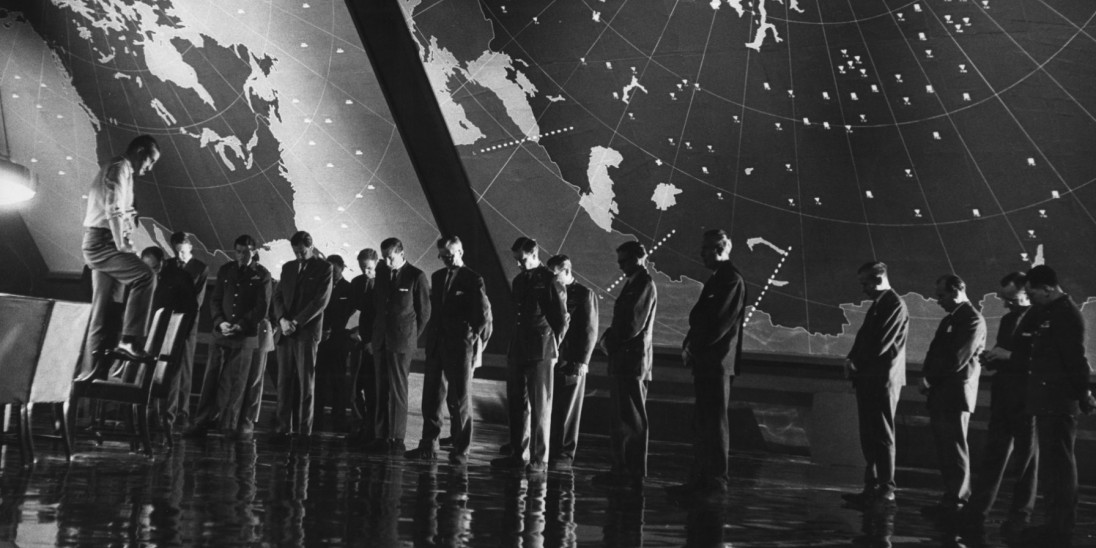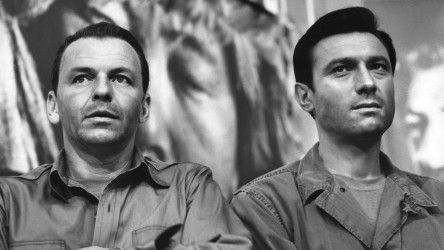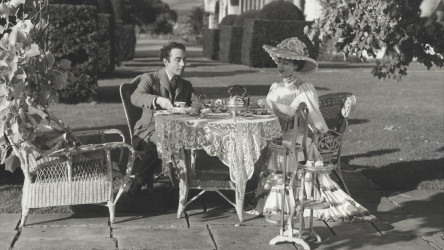Dr. Strangelove(1963)
When America accidentally launches a nuclear attack on Russia, it's up to a bemused British airman to save the day.
Certificate
Age group12+ years
Duration93 mins



Dr Strangelove or: How I Learned to Stop Worrying and Love the Bomb (1964, Kubrick) is a dark comedy about a delusional Air Force General who initiates a nuclear attack on Soviet Russia and the US President's scramble to stop it - so when I say 'dark' comedy you know there's some weight to it. In fact, this light-hearted approach towards the possible destruction to the world is immediately reflected in the title 'How I Learned to Stop Worrying and Love the Bomb', where the 'I' is the audience. As the film reaches its climax, the conflict has been portrayed in such a way that the audience finds the character’s increasingly dire situation, more and more hilarious.
Peter Sellers provides a phenomenal performance as the British RAF Captain as he desperately tries to contact US President Peter Sellers who is accompanied in the War Room by Peter Sellers as the titular Dr Strangelove, George C. Scott's rabid General Turgidson, and Peter Bull's sneaking Soviet Ambassador. Yes, that's right Peter Sellers (have I said his name enough times now) plays three separate roles (all polar opposites to his more commercially successful character Inspector Clouseau), however he doesn't just play them, he lives them. I couldn't even tell they were the same actor until it was pointed out to me, because each one is unique, from their behaviour and mannerisms, to their accents. These are three completely different people. It astounds me that he didn't win any awards for this, losing the Oscar for Leading Actor to Rex Harrison in My Fair Lady.
I’ve always had an interest in the Cold War - the American paranoia of communism, the threat of total annihilation, and the battle of ideologies. This is nothing if not perfectly encapsulated in Strangelove through both the characters and pace of the film. Air Force General Jack Ripper – who initiates the attack – embodies the national paranoia and fear of the Soviets with such outrageous theories, like they’re going to pollute the ‘precious bodily fluids’ of American people, whilst also representing the ideal macho military man who must protect the US from the hidden threat of Communism. Even his name screams of the bully-type drill sergeant – or more obviously the infamous Victorian serial killer. As the tension ramps up and the planes get closer and closer to their targets, the original audience to have seen the film must have been immediately reminded of the Cuban Blockade just two years prior, when the world watched in panic as a very possible Armageddon was just around the corner.
However, as straight-faced and hard-hitting as this sounds, Kubrick brilliantly twists it so we are left laughing at the enveloping catastrophe as well as gripping our seats in suspense. The best example of this is the President’s phone conversations with the unseen partying Soviet Premier who bicker like a married couple. Kubrick even influences the comedy from behind the scenes, like how he tricked George C. Scott into giving a more animated performance by filming his exaggerated exercises and using them (something Scott considered such a betrayal that he refused to work with the director again). The film’s comedic genre is a great contrast to the rest of Kubrick’s filmography, especially his infamously controversial ‘Clockwork Orange’ or the philosophical ‘2001: A Space Odyssey’.
Now, it’s hard to view this film in our current political climate without drawing immediate parallels with it and the twitter war between President Trump and North Korea’s Kim Jong Un – a feud that could potentially lead to nuclear devastation. This is the first time the film has become as relevant as when it was initially released.
In conclusion, Dr Strangelove is not only a fantastic film, one which anyone should see if not just for Sellers amazing performances, but a timeless one as it has become extremely important and relevant in our current lives. I’d strongly recommend it for any modern historian, film buff, someone wanting to watch the classics, even politicians just so they know what not to do. Though some might be put off by the slower pace than modern films and the decision to film in black and white. Actually hey maybe everyone should watch it, it may even help us stop worrying and love the Trump. Or make us worry more with how possible it is this could all play out.
Print this review
Given bravery medals for his Korean War service, a soldier returns home, but may not be all that he seems, as his platoon questions his heroism.
Certificate

A black British comedy about an ambitious young man who embarks on a series of murders to secure a title and a family fortune.
Certificate